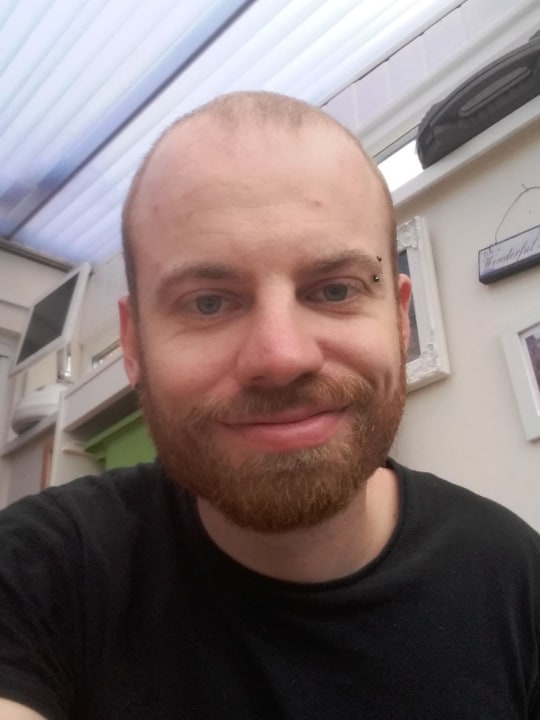In their first podcast episode Steven and William discuss their motivations for asking the age-old question 'Who am I?' and how best to go about their quest of exploring possible paths to an answer.
Watch a Short Excerpt:
Transcript (continued):
William: So you have to spend time with who?
Steven: With lots of quiet people, people that tend to be not as outgoing as maybe the popular group of people, like the masses. And therefore, sometimes in the past, I felt the need to be the one who chats even though I'm quite happy to sit back and, not in a social environment, if everyone was just not talking and no one's saying anything, that feels very uncomfortable. It feels like something's wrong, so it's not right, where actually it's just enjoying each other's presence. But there usually has to be something, you're doing something. If you're all together, you know, you're watching a film or on the computer or you're playing board games, you know. You don't have to necessarily talk to each other in that. But if you're just sitting there having drinks or whatever, then it can be quite difficult to know what to say and how to maintain conversation.
William: Sometimes it's just a mental pause, just reflecting on what was said.
Steven: I always love when someone comes in and it's like they're the person that can sort of like navigate the conversation, the dynamic in the group. I can just sit back, and I don't have to, but I can sort of just bounce off that person.
William: Yeah, it can be nice. It can also be that they take over too much control and then the whole dynamic gets ruined, where everyone had a good share in the conversation. When someone has a personality that's too big for the rest of the group.
Steven: I interrupted, carry on. Sorry. Well, see, I'm doing exactly what I'm talking about.
William: So shall we move on to another topic?
Steven: Well, the link in my brain was: an example of that dominating conversation in a group setting is Dungeons & Dragons of all things. So that's really popular at the moment. It's made an absolutely comeback in the last four or five years.
William: The pen and paper version in person?
Steven: In person, online, again, broadcasting it, twitch streaming it, YouTube streaming it. If you go onto youtube and type in D&D there are hundreds of shows because it's very entertaining. The social dynamic of that is that you have one person guiding the story scenario then you have four people plus or maybe three, depending on the dynamic, and in social situation there's one person that dominates the whole thing. It can be a completely different different game to where if it's even spread. You have the other dynamic the dungeon master or games master: it's their job to actually negotiate that, to make sure that one person isn't dominating things. So it brings in a whole new social structure. And I know people falling out in dungeons and dragons and got upset because one person was trying to control the situation to make sure everyone, like the DM is trying to make sure everyone's having the same amount of fun, but the big personality... And they're enjoying it, you know, they're allowed to enjoy it. They're allowed to have fun, be happy and whatever else. But it's those social clues of being aware. But other people can get involved.
William: How often do you play? Do you meet once a week with your friends?
Steven: I play a little bit at the moment with my brother Ben. But I've just finished up a two-year campaign. Yeah, I just finished a two-year campaign, weirdly with somewhere between 15 and 20 people.
William: What? Online?
Steven: Well, so originally there's about 13 of us in our games group who wants to play dungeons and dragons. And I was like "yeah, let's see what happens". I hadn't DM'd before. I hadn't done it. But I thought "you know what, I always go for the extremes, so I'll try it". And it works reasonably well, but was a difficult dynamic because, again, people weren't getting enough time. I was constantly jumping to different people a lot. And then I split it off into more people jumped in, more people came along. Then I split it off into three groups of five or six, and then a group of one because the story had one sort of "bad person" which was my brother as his character. And then the other groups were on the quest to try and stop him all in the same sort of timeline but different countries. So that was a social dynamic, nightmare, but lots of fun. In hindsight I'll never do it again.
William: And that took two years, to go through the whole story and the whole adventure?
Steven: Yeah, I mean some adventures never stop. So D&D is a weird one where you can have the campaign last a year. They can last ten years depending on the group of people, depending on the story. Most pre-made things from Wizards of the coast who make D&D, I think, a year maybe. If you do it every eight week or two. It might last, the curse of Stroud, that's quite a long one. I think.
William: So does that mean the Dungeon Master has to keep building the world?
Steven: Yes, if it's their own world, yes. If it's the pre-made one they have a general sense of how the world is. And they kind of just use the resources that you've got given, you've been given for that. But yeah, going back to the point: the social dynamic of that is fascinating; trying to listen, again, listen to people, let them have their time.
William: Nice. I've been studying a bit about gamification, and how central games are to learning, and how hopefully the education system, you know schools for children, will adapt. And now it is that being told to shut up, sit down and listen is not productive. There's nothing wrong with you if you can't sit still and listen for hours to something that is not exciting for you. How you can actually use games, simple games, complex games, board games, video games to convey all the things you need in traditional schooling. So I'm excited about becoming aware of that and I wonder what things you learn, because games aren't interesting unless you learn. I think you were saying that the social dynamics are interesting, but what else have you learned just from games like D&D?
Steven: There's a lot of studies going on. I'm assuming studies and discussion going on about how this helps especially in D&D and role-playing games, because it gives you a way to, again, learn social situations that are technically fictional and there's no consequence really to it. So you can help develop your social skills in that manner. A lot of teenagers right now are really getting onto it, especially in America. D&D clubs, groups like stranger things has really blown that up as well because the TV show stranger things is basically based on D&D stuff and has really blown up that ability to learn through a story. You know, if you're acting a story not just reading a story, you know, people love to see a theater or read it or see it on TV or the cinema; this gives you a very immersive experience where you can learn anything like you can learn the social skill, you can learn how you feel about good and evil, or how you would feel in a bar brawl. It can get really emotional because you're attached to your character, you're playing a character. And if your couch gets injured or your party members get injured you go through emotional learning through those experiences. And it is just brilliant.
William: It's like a flight simulator, right? There's no risk of, say, physical harm. But you get the real experience.
Steven: Yeah, and again, if the DM is doing it right and you're doing it right as a group there's no risk for social or psychological or emotional damage because you're with friends, you're in a comfortable situation. And there should be no judgement and just having fun. You can be as silly as you want. You can just let loose. You don't have to hide. You can look for aspects of your own personality through another character if you want to, without realizing. Other people do because they're not out and about "I'm gonna feel judged". They'll just say, you know, "it's the character", but actually they might be actually just exploring part of themselves. And then D&D also has the element where it's just fun and you can just kill everything and that tends to be what happens to start off with, where you get a party come in and you put a scenario in front of them and instead of negotiating or being diplomatic it's just, because it's a fictional world, "we draw our bows and our swords and we go and kill."
William: In D&D you say a lot what you do, right?
Steven: Yes.
William: But when you're with the group of friends in person or I guess you say "I do this", which is not normal speech.
Steven: No.
William: That's interesting.
Steven: You have the third person as well you can say the person's name, your character's name. You say "Sam does that", "Sam is upset", "Sam cries", "Sam whatever" if that's a character's name.
William: You could turn that into a book if you record what everyone says, especially when it's in the third person.
Steven: Again, the podcasts; you just follow someone's game. If you type it into YouTube, if you type it into twitch... I got into the audio stuff about five or six years ago, maybe a bit more, and there's so many, just fun games, and you're just listening to them play. They just listen to them play. The main one that I listen to is acquisitions incorporated, they're the Wizards of the coast guys that make it, their own official D&D team, I guess. They have other ones as well but this one started off as just a little podcast. Two of the players I don't think had even played D&D before. It's been going for ten years. And then they got to the point after a few years, where they did it at conventions on stage in front of people.
William: In costume?
Steven: Yes, sometimes in costume. Wil Wheaton was involved in a few of them. And yeah, it's just it's so much fun and entertaining, and, again, you learn like you do for any fictional medium, really. The whole catharsis thing.
William: I don't like it when when people say "Well, what does that have to do with the real world? That doesn't prepare you for anything really important." But, I mean, reality is what you make of it, first of all. And a game or a movie for that matter, no matter how fictional it is, it's only interesting as long as it has some relation with the real world. If it were totally disconnected and totally abstract it would not be interesting, you wouldn't know what's going on and how is this a story. So there's always some parallel, and some stories are more distant from the world we know than others; but that's just his work.
Other Episodes:
Ep. 51: How Conditioned Are We ?
How much of what you do, think and feel comes from intentional, free chosing? How much of your actions and decisions are pre-programmed? You are the product of your upbringing, culture and genetics. What is out of our control? What can we influence? How can we counteract our predestination?
Ep. 50: What Am I Responsible For ?
Are you taking too little responsibility for your actions, or perhaps too much? How much are you able to understand or determine the consequences of your decisions? Are you in control of anything? Is free will an illusion? Can you do something to improve your thoughts, feelings and relationships with...
Ep. 49: Empathy Can Be A Super Power
Everyone has the choice of either living isolated from other people and their own feelings on the one hand, or to connect with others and their own emotional core. The road towards connectedness involves vulberability and weakness. But it leads to a very rewarding ability that includes deeper understanding of...
Ep. 48: Why Am I Ashamed?
What secrets do you have? What facts about you must never become known to others? What happens in our childhood that implants beliefs in us that hide away for the rest of our life? Can we uncover them deliberately? Can we regain the emotional freedom and levity that playing children...







